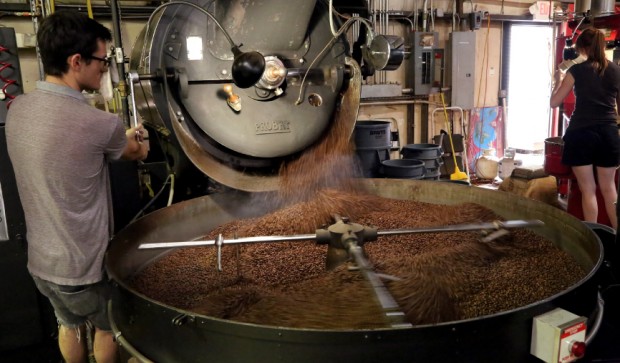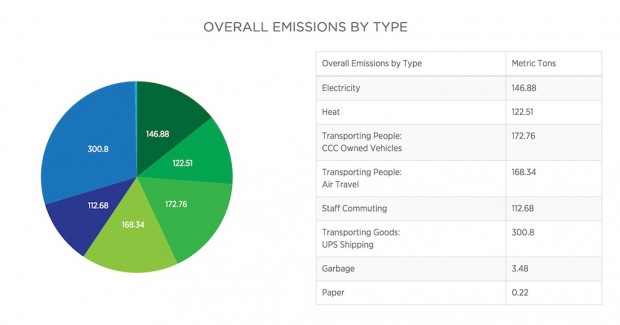We devote a lot of space on this site — some readers might even say too much space — to environmental sustainability issues. Most often the focus of these issues is within the coffee supply chain from seed to import, with particular attention to supply sustainability, certification developments and other environmental and economic issues at origin.
Significantly less spotlight has been shone on environmental sustainability initiatives in the places where coffee is roasted and consumed in its largest quantities — the very places that generate the lion’s share of greenhouse gas emissions within the coffee chain. One of the driving factors in that lack of information is simply that there is less notable work routinely being done on this front.
That’s why the latest in-house sustainability report from wholesale coffee roaster Counter Culture Coffee is so significant — reaching levels of transparency and accountability related to greenhouse gas emissions not commonly seen in the coffee roasting/retailing industry.
When last May we spoke with Meredith Taylor, who had recently joined CCC as sustainability coordinator, she said one of the company’s immediate sustainability goals was to dig deeper into the company’s own sustainability practices stateside, beginning with clearer and more comprehensive tracking and reporting of things like water and energy usage.
It’s no small task, and while CCC has been tracking some of its direct greenhouse emissions since 2010 and buying carbon credits to offset them, the “2014 Greenhouse Gas Report” is its most comprehensive to date. It takes into account not only CCC’s direct emissions through things like propane usage in roasting and fuel usage in fleet vehicles, but also secondary “scopes,” such as emissions from third parties beyond CCC’s control, like those from UPS resulting from the shipping of CCC’s coffees throughout the country.
Early in the report, CCC states:
According to academic research, as well as Counter Culture’s research into our supply chain, the bulk of greenhouse gas emissions—primarily carbon dioxide—occur at the roasting and retail end of the coffee supply chain.
This disparity is especially large when the coffee is grown organically, without the use of chemical fertilizers. In other words, the majority of climate change impacts are being generated on one end of the supply chain and felt on the other end. Although roasting is a relatively small part of these consumption-based emissions, as an actor in the coffee supply chain we have a responsibility to reduce our own impact as much as possible.
A goal of the report is for CCC to more accurately offset emissions. On this year’s offsets, CCC wrote:
Given the amount of time it takes us to collect data, finalize our footprint, and purchase offsets, we will always be reporting on the offsets purchased for the previous footprint. For this 2014 report, we combined the 2012 and 2013 emissions and pooled them together into one offset purchase.
We purchased offsets for our 2012 and 2013 emissions through Cooperative AMBIO, a non-profit organization that works with indigenous communities in Mexico to develop verified carbon offset credits through forestry projects.Counter Culture’s credits will be allocated to coffee farmers in Chiapas, Mexico, who live within the buffer zone of the Selva El Ocote Biosphere Reserve. The Reserve is home to 90 species of mammals and provides an important habitat for migratory birds. Our offset purchase, equivalent to 1,387 tonnes of carbon, will go towards planting trees and sustainably managing existing forests on about 10 hectares (10 hectares= 18.5 american football fields) and directly impact six coffee farming families.
Read the entire report here, including notes on reporting methodology, and transparent reporting of numbers related to roasting operations, fleet operations and emissions. The company also said it plans to form an employee sustainability committee that will provide input on “every aspect of our internal operations — from the materials we bring in to the waste we generate — to examine where we can make the biggest reductions.”
Nick Brown
Nick Brown is the editor of Daily Coffee News by Roast Magazine.
Comment
1 Comment
Comments are closed.








Here’s a sustainability issue I would like to see them address — the only reliable source for *freshly-roasted* bags of Counter Culture’s single-origin beans in Durham, NC (their hometown) is mail-order delivery.
Traveling to the closest cafe that consistently stocks these bags requires a 60 minute round trip to Raleigh.